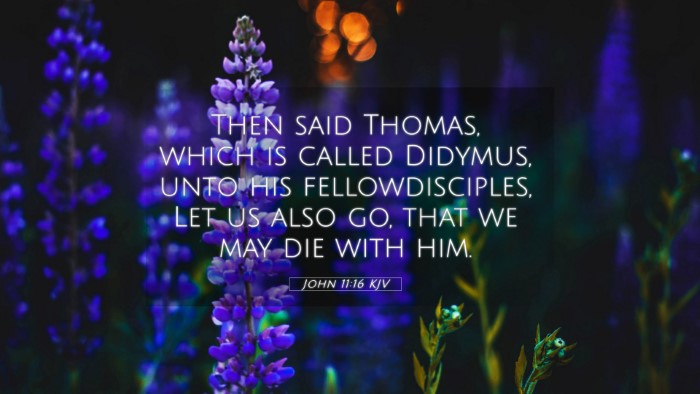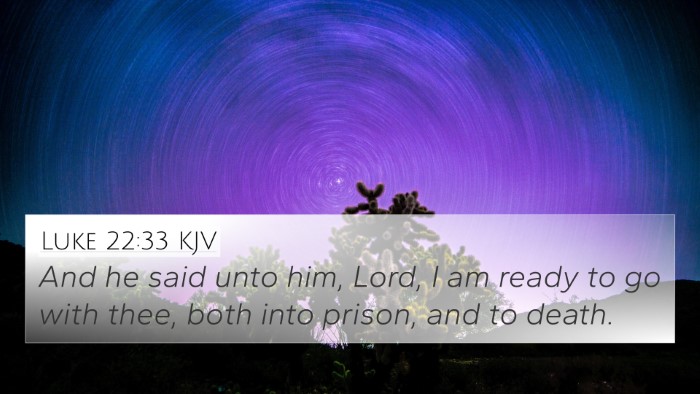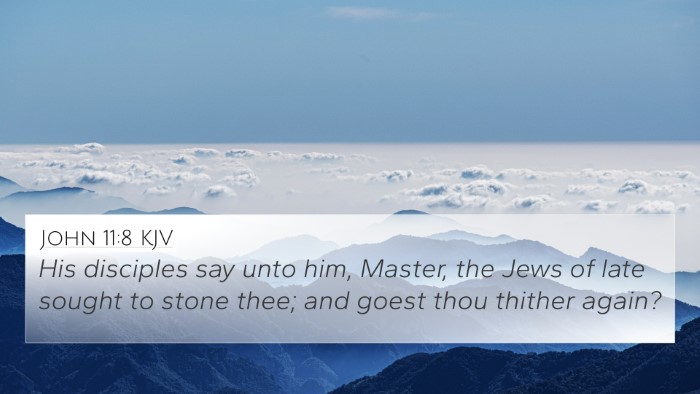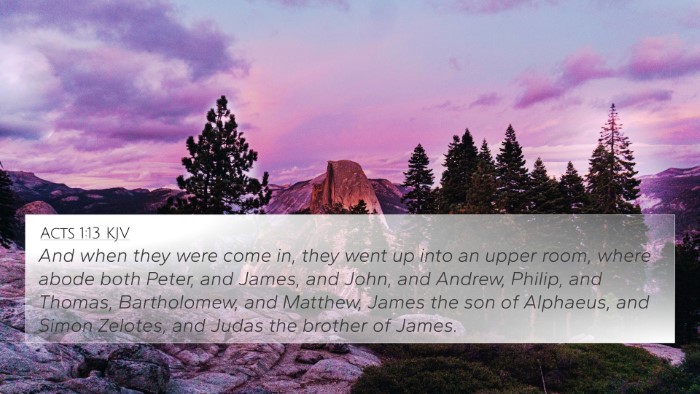Understanding John 11:16
In John 11:16, we see a pivotal moment in the narrative of Lazarus' death and Jesus’ response to it. The verse states: “Then said Thomas, which is called Didymus, unto his fellow disciples, Let us also go, that we may die with him.” This statement reflects both the loyalty and misunderstanding of Thomas and showcases the deep devotion the disciples had for Jesus, even amidst uncertainty.
Summary of Insights from Public Domain Commentaries
The commentaries by Matthew Henry, Albert Barnes, and Adam Clarke provide valuable insights into this verse:
Matthew Henry’s Commentary
Matthew Henry emphasizes Thomas's willingness to go with Jesus to Judea, acknowledging the potential danger that awaited them there. His phrase "Let us also go" suggests a unity and camaraderie among the disciples. Henry notes that while Thomas recognizes the risk of death, his commitment to Christ overrides his fears, showcasing an ultimate loyalty that is both admirable and poignant in light of what is to come.
Albert Barnes’ Commentary
Albert Barnes interprets Thomas's statement as an expression of resignation and bravery. He points out that Thomas, often known for his doubt, exhibits a contrasting response of readiness to face death alongside Jesus. Barnes suggests that this denotes both an acknowledgment of Jesus' mission and a display of the disciples’ mental and spiritual struggle in the face of perilous circumstances.
Adam Clarke’s Commentary
Adam Clarke delves deeper into the implications of Thomas's call to action. He highlights that Thomas, whose other name Didymus means "twin," represents those who grapple with faith and understanding. Clarke discusses how Thomas's declaration reveals the heart of discipleship—an unwavering commitment, regardless of danger, reflecting the foundational principles of Christian bravery and loyalty in the face of adversity.
Interpretation and Thematic Connections
John 11:16 serves as a vivid illustration of various themes prevalent throughout the New Testament:
- Devotion and Sacrifice: Thomas’s willingness to die with Jesus is emblematic of the broader Christian commitment to sacrificial love.
- Faith Amidst Doubt: This illustrates how even those with doubts can exhibit profound faith.
- The Role of Discipleship: The verse emphasizes what it means to be a disciple, characterized by loyalty even when the path ahead is fraught with peril.
- Communal Responsibility: Thomas’ call to the other disciples reflects the idea of collective accountability within the body of believers.
Bible Verse Cross-References
This verse is interconnected with several other passages that highlight themes of abandonment, loyalty, and sacrifice. Here are some key cross-references:
- John 11:4: "But when Jesus heard it, he said, This sickness is not unto death, but for the glory of God, that the Son of God might be glorified thereby."
- Matthew 16:24: "Then said Jesus unto his disciples, If any man will come after me, let him deny himself, and take up his cross, and follow me."
- John 10:11: "I am the good shepherd: the good shepherd giveth his life for the sheep."
- Mark 8:35: "For whosoever will save his life shall lose it; but whosoever shall lose his life for my sake and the gospel's, the same shall save it."
- John 13:37: "Peter said unto him, Lord, why cannot I follow thee now? I will lay down my life for thy sake."
- Luke 22:33: "And he said unto him, Lord, I am ready to go with thee, both into prison, and to death."
- Romans 12:1: "I beseech you therefore, brethren, by the mercies of God, that ye present your bodies a living sacrifice, holy, acceptable unto God, which is your reasonable service."
Thematic Bible Verse Connections
Analyzing the connections between these verses provides a comprehensive understanding of the themes present in John 11:16. For example:
- Links between the Prophets and Apostolic Teachings: Both testaments emphasize the call to sacrifice and loyalty to God's mission.
- Inter-Biblical Dialogue: These connections between the Old and New Testament illustrate God's unchanging call for His followers to take up their crosses.
- Bible Cross-References for Sermon Preparation: The reflections on John 11:16 can serve as a powerful illustration of sacrificial love in sermon contexts.
Conclusion
John 11:16 invites readers to explore the emotional and spiritual landscape of discipleship. The insights from the commentaries highlight themes of loyalty, devotion, and collective responsibility. By engaging with this verse and its numerous cross-references, believers can deepen their understanding of what it means to follow Christ amidst trials and uncertainties.
In studying John 11:16, it is evident that connecting this verse with others not only enriches individual understanding but also elucidates the overarching narrative of faith woven throughout the Bible.













